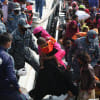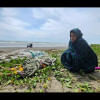Rohingya Repatriation: First batch to return Aug 22
Myanmar and Bangladesh will start another attempt next week to repatriate thousands of Rohingyas who fled violence in Myanmar's Rakhine state, officials said yesterday, nearly a year after a major attempt failed.
The move follows Prime Minister Sheikh Hasina's recent visit to China and Japan, two of Myanmar's close allies, that want a bilateral solution to the crisis.
The Rohingya influx started two years ago on August 25.
On July 30, Bangladesh handed a list of 25,000 Rohingyas of 6,000 families to a visiting Myanmar delegation during a meeting at the state guesthouse, Meghna.
Bangladesh had earlier handed Myanmar lists of some 30,000 Rohingyas for verification of their identity, but only 8,000 of them were verified. Repatriation could not begin as scheduled on November 15 last year as the refugees refused to go.
Reuters reported yesterday that a total of 3,540 refugees have been cleared for return by Myanmar from a list of more than 22,000 names recently sent by Bangladesh, officials from both countries said.
The first group of refugees would return to Myanmar next week, providing any agree to go back.
"We have agreed to the repatriation of 3,540 people on August 22," Myint Thu, a spokesman for Myanmar's Ministry of Foreign Affairs, told Reuters.
Delowar Hossain, director general (Southeast Asia) at the Bangladesh foreign ministry, told The Daily Star: "There is a possibility [of repatriation]. But it's not confirmed yet."
Refugee Relief and Repatriation Commissioner Mohammad Abul Kalam said he has "heard something like this", but was not sure.
Nearly 750,000 Rohingyas fled Rakhine for Bangladesh after a military-led crackdown in August 2017. The United Nations said the perpetrator had "genocidal intent".
Previous attempts at persuading Rohingyas to return to Rakhine have failed due to opposition from refugees. An effort in November failed after the refugee protested.
The refugees say they want to return to Myanmar, but seek the guarantee of citizenship, UN-backed safe zone in Rakhine, recognition of their ethnicity as Rohingya and return to the place from where they were driven out.
A senior Bangladeshi official told Reuters the new effort was a "small-scale" repatriation plan, adding that nobody will be forced to return.
"Bangladesh wants nothing but a safe, voluntary, dignified and sustainable repatriation," said the official, who asked not to be named because he was not authorised to speak to media.
Mohammed Eleyas, an activist of the Arakan Rohingya Society for Peace and Human Rights, said refugees had not been consulted about the process.
Myanmar should agree to the key demands of the community before repatriation begins, he said in a message.
UN officials have been asked to survey the refugees verified by Myanmar to determine whether they want to return, according to internal emails by the refugee agency, UNHCR, seen by Reuters.
"UNHCR will provide refugees with the relevant and reliable information available on the conditions in Myanmar, subject to current constraint on access in the areas of return," one of the emails said.
Tens of thousands of Rohingya remain inside Myanmar, confined to camps and villages across Rakhine state where they are denied citizenship and their movements restricted.
'CLEANING CAMPS'
The UN has said conditions in Rakhine state, where government troops have been fighting an insurgency for months, are not conducive for the return of refugees.
The region has been enveloped in a new war, with government troops fighting Arakan Army insurgents, members of an ethnic armed group that recruits from the mostly Buddhist Rakhine, who make up the majority in the area.
A UN investigator said in July that human rights violations against civilians by security forces and insurgents may amount to fresh war crimes, citing reports of deaths during army interrogations.
Myanmar authorities have blocked most humanitarian agencies, including the UN, from the area.
In July, an Australian think-tank said the government had made "minimal preparations" for the return of refugees.
An analysis of satellite imagery showed no signs of reconstruction in the overwhelming majority of former Rohingya settlements, while destruction of homes continued as recently as this year, the Australian Strategic Policy Institute said.
Min Thein, a director at Myanmar's social welfare ministry, said officials had been sent to reinforce several centres built on the border with Bangladesh that have sat empty for months.
"We are preparing to be ready -- cleaning the transit camps, reinforcing the staff levels," said Min Thein.

 For all latest news, follow The Daily Star's Google News channel.
For all latest news, follow The Daily Star's Google News channel. 








Comments